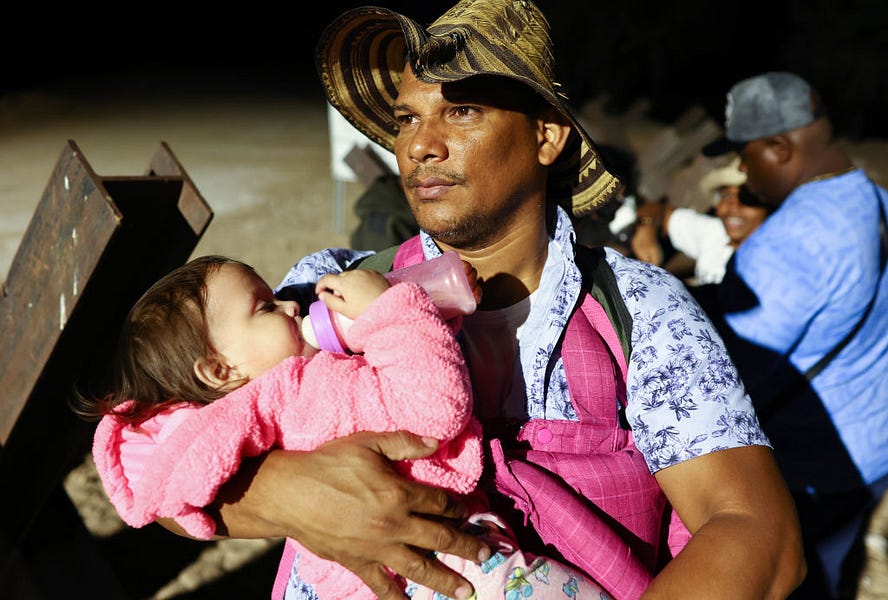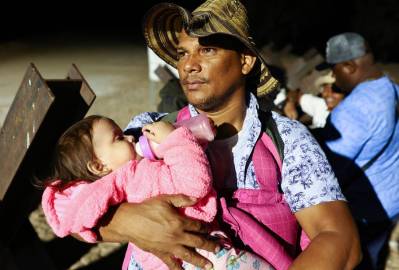If recent electoral trends and recent polling continues, Americans might be witnessing one of the most dramatic shifts in the political map in the modern era. In 2020, while losing reelection to President Joe Biden, former President Donald Trump made significant gains among Hispanic voters, especially in the Rio Grande Valley in Texas and in Miami. And polling on the 2022 midterms seem to indicate this trend will continue. A Recent Quinnipiac survey indicates Hispanics now slightly favor Republicans. In Texas, a survey shows that GOP gains with Hispanics are enduring. Another conducted by the New York Times and Sienna College shows a similar pattern, with both parties tied among this growing voting bloc. This same poll, taken only four years ago, had Democrats with a 47 percent advantage. Republican Glenn Youngkin, who won the blue-trending gubernatorial election in Virginia last year, won a sizable majority of Hispanic voters, according to exit polls conducted by The Associated Press.
Ruy Teixeira, the left-leaning scholar who recently left the Center for American Progress to join the American Enterprise Institute, has been tracking this movement and chalks it up to the way that Democrats have alienated working class Hispanic voters:
One thing that’s very important to understand about Hispanics, particularly working-class voters, is they’re not liberals. They’re moderate to conservative, especially on cultural issues.
This reality should really cause a rethink of modern political axioms on the left and right. On the left, the promise of a more diverse electorate fostered dreams of a permanent liberal majority. “Demography is destiny” was kind of accepted orthodoxy, fueled even more by the rise of Trump who descended the escalator in 2015 uttering intemperate and offensive rhetoric about immigrants. But the right also has its version, first with the famed “autopsy” after the 2012 election that essentially echoed the demography is destiny shibboleth. A darker version, preached by some far right pundits, is the Great Replacement Theory. At its racist worst, this theory posits that as America becomes less white, it becomes less American. More mild versions hold that liberals want to intentionally flood our communities with immigrants in an attempt to replace conservative voters with voters who lean left.
But the non-monolithic voting patterns of Hispanics proved both Democrats and Republicans wrong.
Allies, not adversaries.
Let’s return for a moment to Guy Teixeira’s words, “They’re moderate to conservative, especially on cultural issues.” If this is true, conservatives like me who care deeply about the family, about the sanctity of unborn human life, and about the renewal of our communities and institutions, should see immigrants not as adversaries, but as allies.
It is the cultural issues that are animating this demographic shift, issues like the radicalization of the Democratic Party on issues of gender and sexuality, school choice, and even immigration, where Hispanics largely oppose the haphazard policies of the Biden administration and of the left’s embrace of unworkable policies such as “decriminalizing the border.” Nearly half say they favor a border wall. And they even further oppose the ham-handed identity politics of the left, including the bizarre labeling of “Latinx.” All of this presents conservatives an opportunity.
First, conservatives should not abandon the emphasis on border security, where multiple administrations have struggled to control the flow of migrants and where both parties, often close to reforming our unworkable system, have backed away in favor of using immigration as an election-year wedge. Even a country as welcoming as America cannot have a porous border. Today, it’s a magnet for human traffickers, drug smugglers, and other elements that often prey on our families and communities. Biden’s recent move to authorize the completion of a wall along the Arizona border after his party called such ideas racist and xenophobic shows the complexity of border security.
Secondly, conservatives, while prioritizing border security, should look for ways to open up more legal pathways for immigrants to come here legally. Closing off the gaps in the border should be combined with opportunities for folks escaping tyranny, poverty, and other maladies, like every generation of Americans since our founding, to come here for the chance to build a better life. We can and should debate the proper limits of immigration—we can’t take all of the huddled masses yearning to breathe free—but we should welcome those who see America as a beacon of hope in the world.
Third, conservatives should stop sending messages that immigrants are somehow a threat to our way of life. Not only does economic data show that measured, stable, common-sense flows of immigration are a boon to our economy, but on the issues that many conservatives care about, such as family and the sanctity of human life, immigrants are natural allies. Most recent polling shows that Hispanics are more pro-life than the general population and tend to be more religious.
What’s more, when it comes to families, it seems that immigrant families are often more stable than the general American population. A report conducted by the Institute for Family Studies found that among immigrant families with children, 72 percent were still in their first marriage. In a study by the same organization, of immigrant families in California, 70 percent said that it was important to get married before having children. For evangelicals, according to pastors such as Tim Keller, it is immigrant communities who are revitalizing the church, resisting the dogmas of the left. Some have even argued that increased immigration might help solve America’s birth rate crisis.
As conservatives reshape their policy priorities around the family in the wake of Dobbs and to address the growing concerns of parents on issues such as education, we might reconsider the sometimes reflexive opposition to sensible immigration policy. This opposition can involve turning our backs on would-be Americans who might love our country more than we do, having escaped Marxism, socialism, or tyranny in other places. And we might also be resisting the influx of communities that share our similar values. A more diverse country, after all, just might be the very remedy we need for American renewal.
Daniel Darling is the director of the Land Center for Cultural Engagement at Southwestern Baptist Theological Seminary, a columnist for World Magazine, a contributor to USA Today, and the author of several books, including The Dignity Revolution, A Way With Words, and The Characters of Creation.






Please note that we at The Dispatch hold ourselves, our work, and our commenters to a higher standard than other places on the internet. We welcome comments that foster genuine debate or discussion—including comments critical of us or our work—but responses that include ad hominem attacks on fellow Dispatch members or are intended to stoke fear and anger may be moderated.
With your membership, you only have the ability to comment on The Morning Dispatch articles. Consider upgrading to join the conversation everywhere.